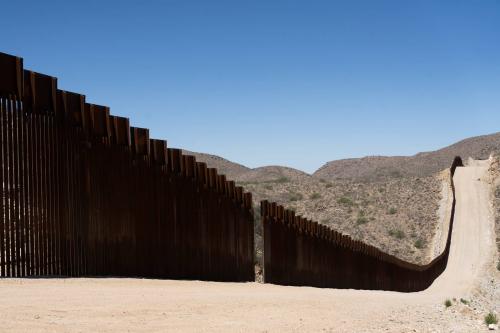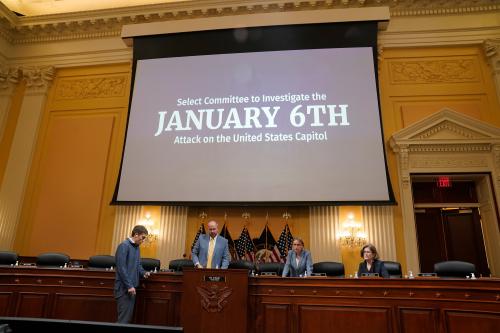Are we hurtling towards the Great Guantanamo Showdown? We may be.
Over the last few weeks, Congress and the White House have been circling one another, angling for that final bit of leverage that will define whether President Obama does or does not get to fulfill his first-week-in-office pledge to shutter the Guantanamo Bay detention facility. In the last few days, the maneuvering has even come to include open suggestions of an out-and-out clash between executive and legislative war powers.
The reason is simple: President Obama is running out of time to fulfill his pledge, in the merits of which he deeply believes. And there is no longer any obvious route to his doing so with legislative cooperation. The result is that if Obama wants to be the guy who fulfills the commands of thousands of bumper stickers nationwide, he will likely have to butt heads with Congress on a deep—and frankly open—question of constitutional war powers.
This issue has been brewing for almost the entirety of the Obama presidency. Obama wants to close Guantanamo. The majority of Congress does not want him to close Guantanamo, at least not by any means currently feasible. Congressional Republicans admit that they don’t want Guantanamo closed. Democrats often feign a desire to see the facility closed, but they haven’t stood in the way of the transfer restrictions that—if adhered to—make the closure impossible.
This dance has gone on every year since the beginning of the administration: Congress imposes restrictions on transfer, and Obama objects to them while also complying with them. In recent years, he has objected in constitutional terms, reserving the possibility that he might in some instances “implement them in a manner that avoids the constitutional conflict” to the extent that “the restrictions on the transfer of detainees operate in a manner that violates constitutional separation of powers principles…” Until this year, however, he had always stopped short actually of vetoing the National Defense Authorization Act (NDAA), the annual bill in which these restrictions show up. And as I say, he has, whatever his feelings on the subject, complied with the restrictions.
This year has been different. First off, the administration has inexplicably failed to provide Congress with the long-sought plan for Guantanamo’s closure. Second, Congress turned around and actually tightened, rather than loosening, the transfer restrictions in this year’s NDAA. Third, Obama finally followed through on his threat and vetoed the NDAA, citing Guantanamo among the reasons:
I have repeatedly called upon the Congress to work with my Administration to close the detention facility at Guantanamo Bay, Cuba, and explained why it is imperative that we do so. As I have noted, the continued operation of this facility weakens our national security by draining resources, damaging our relationships with key allies and partners, and emboldening violent extremists. Yet in addition to failing to remove unwarranted restrictions on the transfer of detainees, this bill seeks to impose more onerous ones. The executive branch must have the flexibility, with regard to those detainees who remain at Guantanamo, to determine when and where to prosecute them, based on the facts and circumstances of each case and our national security interests, and when and where to transfer them consistent with our national security and our humane treatment policy. Rather than taking steps to bring this chapter of our history to a close, as I have repeatedly called upon the Congress to do, this bill aims to extend it.
And finally, Congress is now poised to pass a revised NDAA without addressing Obama’s Guantanamo concerns—and to do so with a veto-proof majority in both houses (the House has already acted; the Senate is scheduled to tomorrow).
The result is that while it still remains theoretically possible that Obama could present a Guantanamo closure plan that Congress could attach to some other bill, the overwhelming likelihood is that we will head into Obama’s final year in office with the laws on the books forbidding some key things the administration would need to do to get the closure done. Transfers to the United States will be illegal, as will construction of facilities in the United States to house detainees. Transfers overseas will be difficult.
This, in turn, raises the question of whether the president will continue to obey these particular laws—and whether or not he has to.
Last week, White House spokesman Josh Earnest conspicuously did not rule out unilateral presidential action to close Guantanamo:
Q: What’s the current thinking on the ability to keep that promise given the Republicans’ control of Congress and their steadfast opposition to closing it? Is it still—do you still at this point at this late date see it as possible this President will leave office having closed Guantanamo?
MR. EARNEST: Absolutely, it’s still possible, and it’s still something that we are working very hard to accomplish. The President agrees with these 28 retired generals and admirals that this is a national security imperative, one that the President identified, frankly, before he was elected to this office. And the President is determined to—despite the significant congressional obstacles that have been erected—is determined to accomplish this goal.
Q: Will he need congressional approval to do it? Is there a way to do it without Congress voting affirmatively to?
MR. EARNEST: Well, it’s certainly going to be easier if we can get Congress to cooperate in that effort.
Q: Understood. But is it possible to do it without congressional approval?
MR. EARNEST: Well, I haven’t conducted my own review of the authority that’s available to the President.
Q: You guys have been kicking around this issue for a long time. What’s your—
MR. EARNEST: Well, our preference is that we would like to work with Congress to try to get this done.
Q: It sounds like you’re saying it’s possible without—
MR. EARNEST: I certainly wouldn’t take off the table the ability of the President to use whatever authority is available to him to try to move closer to accomplishing this goal. I don’t say that with any specific action in mind. I just say it to illustrate to you the determination that the President feels to try to get this done.
Over the weekend, former White House Counsel Gregory Craig and former State Department Guantanamo envoy Cliff Sloan, in a Washington Post op-ed, made an affirmative case for defying the transfer restrictions:
As President Obama approaches the final year of his presidency, the urgency of closing the Guantanamo Bay detention facility looms large. Some maintain that the congressional ban on transfers from Guantanamo to the United States prevents closure without congressional approval. But that is wrong. Under Article II of the Constitution, the president has exclusive authority to determine the facilities in which military detainees are held. Obama has the authority to move forward. He should use it.
. . .
Congress has enacted legislation banning the use of funds to transfer Guantanamo detainees to the United States for any purpose, including incarceration and prosecution. But that irrational prohibition need not inhibit the closure of the facility. The restriction is plainly unconstitutional.
The Constitution assigns Congress the important power to “declare war.” But Article II designates the president as “Commander in Chief” of the military. Recognizing that the president needs flexibility to select among tactical options in the conduct of war, the Framers explicitly rejected giving Congress the power to “make war,” rather than declare war. As Alexander Hamilton explained in the Federalist Papers, “Of all the cares or concerns of government, the direction of war most peculiarly demands those qualities which distinguish the exercise of power by a single hand.”
Thus the president, in his capacity as commander in chief, has the exclusive authority to make tactical military decisions. Congress can declare war but cannot direct the conduct of military campaigns. It can pass generally applicable military regulations but cannot direct the military’s response to contingent developments. It can authorize detentions and military tribunals and broadly regulate the treatment of prisoners of war, but it cannot direct specific facilities in which specific detainees must be held and tried. Yet that is precisely what Congress has attempted.
Does Obama, in fact, have the power to do this?
The question turns, in my view, only partly on the Commander in Chief Clause of Article II, as Craig and Sloan contend. It also depends on the so-called “Captures Clause” of Article I. The Captures Clause gives Congress the power to “make Rules concerning Captures on Land and Water.” A nearby clause gives Congress power “To make rules for the government and regulation of the land and naval forces.” If these powers cover the capture and detention of people—like, say, Guantanamo detainees—they presumably give to Congress the power to require that those detainees be held at Guantanamo, rather than in some facility in the mainland.
But do they? In my opinion, at least, the Captures Clause is the better bet for Congress, so let’s focus on that.
Authorities are actually divided on the question of the Captures Clause. Ingrid Wuerth, author of a terrific exposition of the meaning of the clause, concludes that “The best reading of the Continental Congress’s power over ‘captures’ was that it had a relatively narrow reach—not extending to persons, and only to certain kinds of property—but that the type of control it exercised was broad, including the power to determine what captures could be made by both private and public vessels. . . . [T]his is also the best reading of the text of the Constitution.” By this reading, Craig’s and Sloan’s argument would—in my judgment, anyway—be quite plausible.
On the other hand, Judge Brett Kavanaugh of the D.C. Circuit, described the question in one judicial opinion as follows:
Congress possesses express constitutional authority to make rules concerning wartime detainees. See, e.g., U.S. CONST. art. I, § 8 (“Congress shall have Power…To…make Rules concerning Captures on Land and Water”). The constitutional text, Justice Jackson’s Youngstown opinion, and recent Supreme Court precedents indicate that the President does not possess exclusive, preclusive authority over the transfer of detainees. See Hamdan v. Rumsfeld, 548 U.S. 557 (2006); Hamdi v. Rumsfeld, 542 U.S. 507 (2004); Youngstown Sheet & Tube Co. v. Sawyer, 343 U.S. 579, 634 (1952) (Jackson, J., concurring). Except perhaps in a genuine, short-term emergency, the President must comply with legislation regulating or restricting the transfer of detainees. In other words, under the relevant precedents, the President does not have power to trump legislation regarding wartime transfers in a Youngstown category-three situation. To be sure, there are weighty policy reasons why Congress may not seek to restrict the Executive’s transfer authority or to involve the Judiciary in reviewing war-related transfers. That presumably explains why Congress has not done so. But to the extent Congress wants to place judicially enforceable restrictions on Executive transfers of Guantanamo or other wartime detainees, it has that power.
In the end, there is no controlling authority on the question. As a practical matter, therefore, Obama could probably get away with moving on a unilateral basis on the theory that he has Commander in Chief powers to make tactical decisions and the Congress’s power to make rules for captures does not apply to these—or any—people, at least not to the extent of regulating where one holds them.
But in contrast to the claims of Craig and Sloan—who insist that “One need not accept a particularly broad view of executive authority…to see that the restrictions Congress has imposed are unconstitutional”—this would be a bold assertion of executive authority. The president would be suddenly defying laws he has consistently observed. And he would be doing so only at the point he had lost the ability to get them changed.
This post also appears on
Lawfare
.



Commentary
The great Guantanamo showdown
November 9, 2015